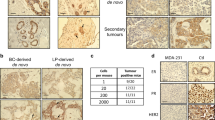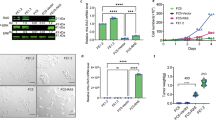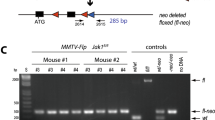Abstract
We have previously demonstrated that amplification and overexpression of the Ki-ras gene is associated with mammary tumor progression in C3(1)/SV40Tag transgenic mice (Liu et al., 1998). To further evaluate the functional significance of the Ki-ras proto-oncogene in mammary cancer development, in vivo studies were conducted to examine the effect of Ki-ras gene dosage on tumor progression. The lack of one normal Ki-ras allele C3(1)/SV40Tag transgenic mice resulted in significantly delayed mammary intraepithelial neoplasia (MIN) formation as well as in a decreased number of mammary gland carcinomas. However, despite the retardation of tumor development by reduced Ki-ras gene dosage, overall survival was only modestly affected. This appears to be due to several factors including significant mammary tumor growth associated with Ki-ras gene amplification and over-expression that occurs during the advanced stage of oncogenesis in mice carrying either one or two normal Ki-ras alleles. The retardation of tumor progression due to the haploid loss of Ki-ras did not appear to be related to accelerated apoptosis, or a reduced rate of cell proliferation at the tumor stages examined. These data strongly suggest that the gene dosage of Ki-ras affects tumor promotion at an early stage of mammary tumor progression in this SV40 Tag-induced model of mammary oncogenesis.
This is a preview of subscription content, access via your institution
Access options
Subscribe to this journal
Receive 50 print issues and online access
$259.00 per year
only $5.18 per issue
Buy this article
- Purchase on Springer Link
- Instant access to full article PDF
Prices may be subject to local taxes which are calculated during checkout




Similar content being viewed by others
Abbreviations
- Ab:
-
antibody
- AH:
-
atypical hyperplasia
- BrdU:
-
5-bromo-2′-deoxyuridine
- ISH:
-
in situ hybridization
- NAH:
-
nodular atypical hyperplasia
- PCR:
-
polymerase chain reaction
- SV40Tag:
-
simian virus 40 large T antigen
- TUNEL:
-
terminal deoxynucleotidyl transferase-mediated dUTP-digoxigenin nick end labeling.
References
Barbacid M . 1987 Ann. Rev. Biochem. 56: 779–827
Bos JL, Verlaa-de-Vries M, Marshall CJ, Veeneman GH, van Boom JH, van der Eb AJ . 1986 Nucleic Acids Res. 14: 1209–1217
Capon DJ, Seeburg PH, McGrath JP, Hayflick JS, Edman U, Levinson AD, Goeddel DV . 1983 Nature 304: 507–513
Fearon ER, Vogelstein B . 1990 Cell 61: 759–767
Filmus JE, Buick RN . 1985 Cancer Res. 45: 4468–4472
Fueyo J, Gomez-Manzano C, Yung WK, Liu TJ, Alemany R, McDonnell TJ, Shi X, Rao JS, Levin VA, Kyritsis AP . 1998 Nat. Med. 4: 685–690
Fuijita J, Srivastava SK, Kraus MH, Rhim JS, Tronick SR, Aaronson SA . 1985 Proc. Natl. Acad. Sci. USA 82: 3849–3853
Garcia I, Dietrich P-Y, Aapro M, Vauthier G, Vadas L, Engel E . 1989 Cancer Res. 49: 6675–6679
George DL, Glick G, Trusko S, Freeman N . 1986 Proc. Natl. Acad. Sci. USA 83: 1651–1655
Graham KA, Richardson CL, Minden MD, Trent JM, Buick RN . 1985 Cancer Res. 45: 2201–2205
Green JE, Shibata M-A, Yoshidome K, Liu M-L, Jorcyk C, Anver M, Wigginton J, Wiltrout R, Shibata E, Kaczmarczyk S, Wang W, Liu Z-Y, Calvo A, Couldrey C . 2000 Oncogene 19: 1020–1027
Ise K, Nakamura K, Nakao K, Shimizu S, Harada H, Ichise T, Miyoshi J, Gondo Y, Ishikawa T, Aiba A, Katsuki M . 2000 Oncogene 19: 2951–2956
Johnson L, Greenbaum D, Cichowski K, Mercer K, Murphy E, Schmitt E, Bronson RT, Umanoff H, Edelmann W, Kucherlapati R, Jacks T . 1997 Genes Dev. 11: 2468–2481
Khosravi-Far R, Der CJ . 1994 Cancer Metastasis Rev. 13: 67–89
Liu M-L, Von Lintig FC, Liyanage M, Shibata M-A, Jorcyk CL, Ried T, Boss GR, Green JE . (1998). Oncogene 18: 2403–2411
Maroulakou IG, Anver M, Garrett L, Green JE . 1994 Proc. Natl. Acad. Sci. USA 91: 11236–11240
Maroulakou IG, Shibata MA, Anver M, Jorcyk CL, Liu M-L, Roche N, Roberts AB, Tsarfaty I, Reseau J, Ward J, Green JE . 1999 Oncogene 18: 5435–5447
Prosperi M-T, Dupre G, Lidereau R, Goubin G . 1990 Cancer Letts 51: 169–174
Scheele JS, Pilz RB, Quilliam LA, Boss GR . 1994 J. Biol. Chem. 269: 18599–18606
Shibata M-A, Maroulakou IG, Jorcyk CL, Gold LG, Ward JM, Green JE . 1996 Cancer Res. 56: 2998–3003
Shibata M-A, Yoshidome K, Shibata E, Jorcyk CL, Green JE . 2001 Cancer Gene Ther. 8: 23–35
Sills RC, Boorman GA, Neal JE, Hong HL, Devereux TR . 1999 IARC Sci. Publ. 146: 55–86
Tanaka T, Slamon DJ, Battifora H, Cline MJ . 1986 Cancer Res. 46: 1465–1470
Westaway D, Papkoff J, Moscovici C, Varmus HE . 1986 EMBO J. 5: 301–309
Acknowledgements
The authors are grateful to Lisa Birely for excellent technical assistance with animal care, Tyler Jacks for kindly providing the S-9-2 plasmid containing the ki-ras genomic fragment and providing mice carrying the ki-ras mutant allele, and Kartiki Desai for critical review of the manuscript.
Author information
Authors and Affiliations
Rights and permissions
About this article
Cite this article
Liu, ML., Shibata, MA., Von Lintig, F. et al. Haploid loss of Ki-ras delays mammary tumor progression in C3 (1)/SV40 Tag transgenic mice. Oncogene 20, 2044–2049 (2001). https://doi.org/10.1038/sj.onc.1204280
Received:
Revised:
Accepted:
Issue Date:
DOI: https://doi.org/10.1038/sj.onc.1204280
Keywords
This article is cited by
-
The epigenetic modifier JMJD6 is amplified in mammary tumors and cooperates with c-Myc to enhance cellular transformation, tumor progression, and metastasis
Clinical Epigenetics (2016)
-
Unlocking the power of cross-species genomic analyses: identification of evolutionarily conserved breast cancer networks and validation of preclinical models
Breast Cancer Research (2008)
-
EGFR associated expression profiles vary with breast tumor subtype
BMC Genomics (2007)



